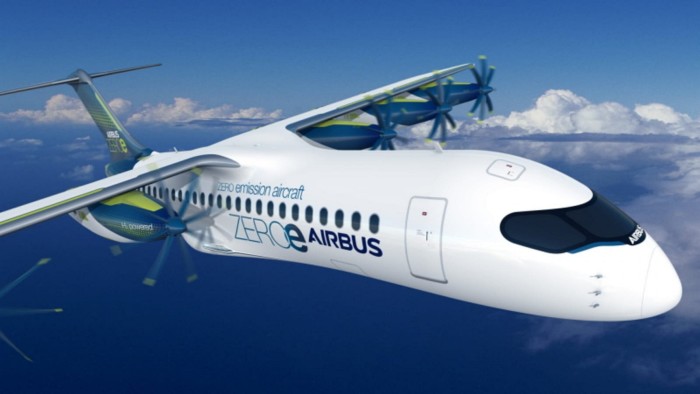Stay informed with free updates
Simply sign up to the Aerospace & Defence myFT Digest — delivered directly to your inbox.
Airbus has delayed plans to fly a hydrogen-powered aircraft by 2035 in a setback for the aviation industry’s hopes to achieve net zero.
The decision to abandon the deadline for the short-range aircraft was relayed to staff on Thursday. Airbus declined to comment specifically on a statement by French labour unions which said the entry into service had been delayed by five to ten years.
The company as recently as Tuesday told the Financial Times that “2035 remains the ambition” for the aircraft after European airlines this week scaled back their ambitions for hydrogen’s role in reaching net zero by 2050.
Airbus on Friday said the hydrogen aircraft was “expected to come later than 2035”. It said it remained “committed to [its] goal of bringing a commercially viable, hydrogen-powered aircraft to market”.
However, the company said it recognised that “developing a hydrogen ecosystem — including infrastructure, production, distribution and regulatory frameworks — is a huge challenge requiring global collaboration and investment”.
Recent developments, it added, “indicate that progress on key enablers, particularly the availability of hydrogen produced from renewable energy sources at scale, is slower than anticipated”.
Airbus has been much more bullish than US rival Boeing about the potential for hydrogen to help decarbonise emissions from flying. Engineers at the company have been working on several different zero-emission concepts, all of which rely on hydrogen as their primary power source, since 2020.
The union also said that Airbus had indicated it would cut the budget dedicated to its hydrogen initiatives by 25 per cent and planned to shut down plans to test hydrogen fuel cell engines on a modified A380 superjumbo.
Guillaume Faury, Airbus chief executive, acknowledged the challenges last month, saying “it’s not enough to have a plane if you have no infrastructure, no hydrogen in the right place, at the right time, at the right quantity and the right price”.
In an update to a net zero road map published on Tuesday, five aviation industry groups said they expected hydrogen-powered planes to be responsible for just 6 per cent of net emissions reductions by 2050, down from 20 per cent in 2021.
Instead, the industry is increasingly reliant on “sustainable aviation fuels” to cut emissions. These can be made from crops, waste cooking oil and other non fossil fuel feedstocks, and can reduce net CO₂ emissions by around 70 per cent when compared with jet fuel. But such fuels are more expensive and are currently only produced in very limited quantities.


